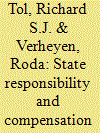| Srl | Item |
| 1 |
ID:
193742


|
|
|
|
|
| Summary/Abstract |
Earlier meta-analyses of the economic impact of climate change are updated with more data, with three new results: (1) The central estimate of the economic impact of global warming is always negative. (2) The confidence interval about the estimates is much wider. (3) Elicitation methods are most pessimistic, econometric studies most optimistic. Two previous results remain: (4) The uncertainty about the impact is skewed towards negative surprises. (5) Poorer countries are much more vulnerable than richer ones. A meta-analysis of the impact of weather shocks reveals that studies, which relate economic growth to temperature levels, cannot agree on the sign of the impact whereas studies, which make economic growth a function of temperature change do agree on the sign but differ an order of magnitude in effect size. The former studies posit that climate change has a permanent effect on economic growth, the latter that the effect is transient. The impact on economic growth implied by studies of the impact of climate change is close to the growth impact estimated as a function of weather shocks. The social cost of carbon shows a similar pattern to the total impact estimates, but with more emphasis on the impacts of moderate warming in the near and medium term.
|
|
|
|
|
|
|
|
|
|
|
|
|
|
|
|
| 2 |
ID:
050511


|
|
|
|
|
| Publication |
June 2004.
|
| Summary/Abstract |
Customary international law has that countries may do each other no harm. A country violates this rule if an activity under its control does damage to another country, and if this is done on purpose or due to carelessness. Impacts of climate change fall under this rule, which is reinforced by many declarations and treaties, including the UNFCCC. Compensation for the harm done depends on many parameters, such as emission scenarios, climate change, climate change impacts and its accounting. The compensation paid by the OECD may run up to 4% of its GDP, far exceeding the costs of climate change to the OECD directly. However, the most crucial issues are, first, from when countries can be held responsible and, second, which emissions are acceptable and which careless. This may even be interpreted such that the countries of the OECD are entitled to compensation, rather than be obliged to pay. State responsibility could substantially change international climate policy.
|
|
|
|
|
|
|
|
|
|
|
|
|
|
|
|